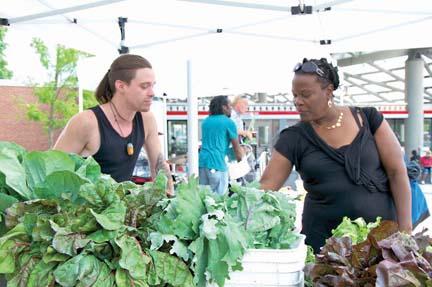July 11, 2013

A visitor to the Ashmont-Peabody Square Farmers’ Market inspected the offerings from Spring Brooke Farms on a recent Friday afternoon. Photo by Lianne Ames
In a big city, fresh, nutritious food can be hard to come by. The farmers markets of Dorchester aim to solve that problem, providing locations for local farms to vend fresh produce and creating spaces for the community to gather.
At the Dorchester House Farmers Market on Tuesday, stalls packed with bins of colorful fruits and vegetables stood in the parking lot as customers, many of whom are patients of, or involved with, Dorchester House, gathered to look over the stands, which included two produce vendors, a WIC outreach counter, and a table with volunteers from the UMass Extension Nutrition Education Program handing out food samples and healthy recipes.
Much of the specialty produce on sale at Dorchester House caters especially to local Vietnamese who frequent the market, which has undergone a recent expansion. New this year is Red’s Best, a Boston seafood vendor that sells fresh-caught fish at several markets. Seafood is a recent addition to many market sites, and Mary Lynch, the Dorchester House market manager, said that the fresh fish is a popular addition that brings in more customers. Lynch, a nutritionist, said that Dot House has as its mission increasing access to healthy food for its patients.
“Dorchester House is an anchor organization in this neighborhood,” she said. “We need to support the messages we give patients everyday, and real nutrition is more than just giving messages.”
Another important facet of the farmers markets is the presence of local, sustainable agriculture. A majority of the farms providing the produce are organic, with some using integrated pest management (IPM) systems. At ReVision Urban Farm, a small urban setting located off Blue Hill Avenue, sustainable growing practices are of the utmost importance. The farm started more than 20 years ago as a community garden for residents of the ReVision Family Home. People staying at the shelter could grow their own food and learn about responsible agriculture.
While ReVision still provides fresh food to shelter residents, it has expanded its reach in the community by, among other things, establishing a program through the Boston Youth Fund, taking a few young people each summer and exposing them to the practice of sustainable agriculture.
“What we all have in common is that we all eat and we all love fresh, organic vegetables,” said farm manager Jolie Olivetti, citing the community effort involved in making a farmers market work. “We’re only able to do what we do because of the support of the community.”
In turn, the farmers markets have been supporting the community; more than 20 of the 26 farmers markets in the city participate in the Boston Bounty Bucks program, which provides the markets with wireless EBT terminals and allows the use of SNAP benefits by providing a dollar-for-dollar matching incentive for all SNAP purchases up to $10. Additionally, many farmers markets also accept WIC and Senior Farmers’ Market Nutrition Program coupons.
“We want to use [the farmers markets] as food hubs to create spaces where residents can learn about healthy living and purchase nutritious foods,” said Jennifer Obadia, the coordinator for farmers markets in Boston through the Boston Food and Fitness Collaborative.
According to Obadia, the Boston Bounty Bucks program has grown dramatically. In 2008, the program resulted in the spending of about $2,500 in combined incentive and federal benefits; last year’s season saw that number increase to more than over $150,000.
Although the Boston Food and Fitness Collaborative works with existing markets to help them expand their services, Obadia said that the increased number of markets has been driven mainly by residents of the community. “The opening of markets on their own has really been organic,” she said, adding that each one takes on a distinct character reflective of the neighborhood it serves.
Organizers of farmers market see them as opportunities to provide not only fresh, local food, but also community gathering spaces. The Ashmont/Peabody Square Farmers Market hosts the Dorchester Arts Collaborative in addition to live music, and is always looking for new local artists. This week,organizers were asking people to take an economic impact survey and entering participants in a raffle for an Ashmont Cycles gift card.
“[The market] becomes a community center as well as a place to get food,” said manager Dan Larner. “It’s good for the life of the neighborhood itself.”
This summer, the Codman Square Farmers Market will have a different mayoral candidate visiting each week. Cynthia Loesch of the Codman Square Neighborhood Council said that locals can use this opportunity to ask the candidates about anything, including city health policies and programs.
Additionally, visiting personnel from MGH are available at the market to take blood pressure readings and discuss health with patrons.
To Loesch, and many others involved in organizing these farmers markets, the mission is for people to see all the resources available to them in leading a healthy lifestyle.
“There aren’t just 19 weeks in a year,” she said. “Our ultimate goal is to have something more sustainable and permanent.” For a full list of farmers markets in the Dorchester area, and in other Boston locations, visit bostonfarmersmarkets.org.
Topics:



